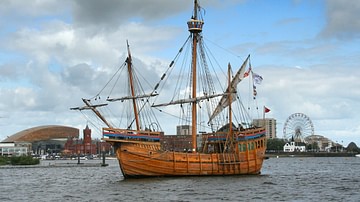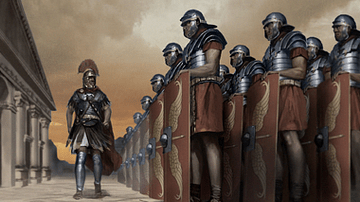Search Definitions
Browse Content (p. 100)

Definition
Portuguese Macao
Macao (Macau) is located on a peninsula in the estuary of the Pearl River delta in southeast China and it was a Portuguese colonial settlement from c. 1557 until 1999. Macao was a major trade hub of the Portuguese Empire and with its unique...

Definition
Caravel
The caravel (caravela in Spanish and Portuguese), was a type of medium-sized ship which, with its low draught and lateen or triangular sails, made it ideal for exploration from the 15th century onwards. Fast, manoeuvrable, and only needing...

Definition
Sacred Band of Thebes
The Sacred Band of Thebes was an elite unit of the Theban army comprised of 150 gay male couples totaling 300 men. They were formed under the leadership of Gorgidas but first achieved fame under the general Pelopidas. They remained invincible...

Definition
Ferdinand Magellan
Ferdinand Magellan, or Fernão de Magalhães (c. 1480-1521), was a Portuguese mariner whose expedition was the first to circumnavigate the globe in 1519-22 in the service of Spain. Magellan was killed on the voyage in what is today the Philippines...

Definition
Matariki
The Maori people of Aotearoa (New Zealand) have long observed the heliacal (pre-dawn) rising of the star cluster commonly known throughout the world as Pleiades or Messier 45 (M45), located in the constellation of Taurus. Matariki is the...

Definition
Legio V Alaudae
Legio V Alaudae, referenced in early accounts only as the "Fifth", was one of the many legions of the Roman army that helped Julius Caesar (100-44 BCE) to achieve success as a military commander in Gaul, Spain, and Africa. Later stationed...

Definition
Portuguese Goa
Goa, located on the west coast of India, was a Portuguese colony from 1510 to 1961. The small coastal area was conquered by Afonso de Albuquerque (c. 1453-1515) and became an important trade hub for the Eastern spice trade. Goa was the capital...

Definition
Sappho of Lesbos
Sappho of Lesbos (l. c. 620-570 BCE) was a lyric poet whose work was so popular in ancient Greece that she was honored in statuary, coinage, and pottery centuries after her death. Little remains of her work, and these fragments suggest she...

Definition
Holy Roman Empire
The Holy Roman Empire officially lasted from 962 to 1806. It was one of Europe’s largest medieval and early modern states, but its power base was unstable and continually shifting. The Holy Roman Empire was not a unitary state, but a confederation...

Definition
Portuguese Cochin
Cochin, located on the southwest coast of India, was a Portuguese colony from 1503 to 1663. Known to the Portuguese as Cochim, it was one of several important cities on India’s Malabar Coast and a great trade centre for spices like pepper...